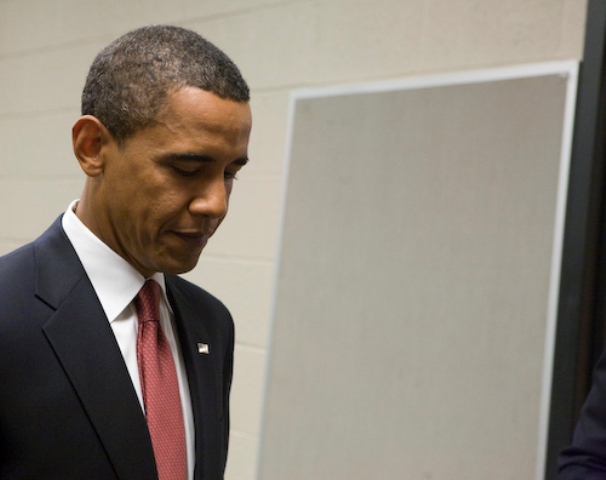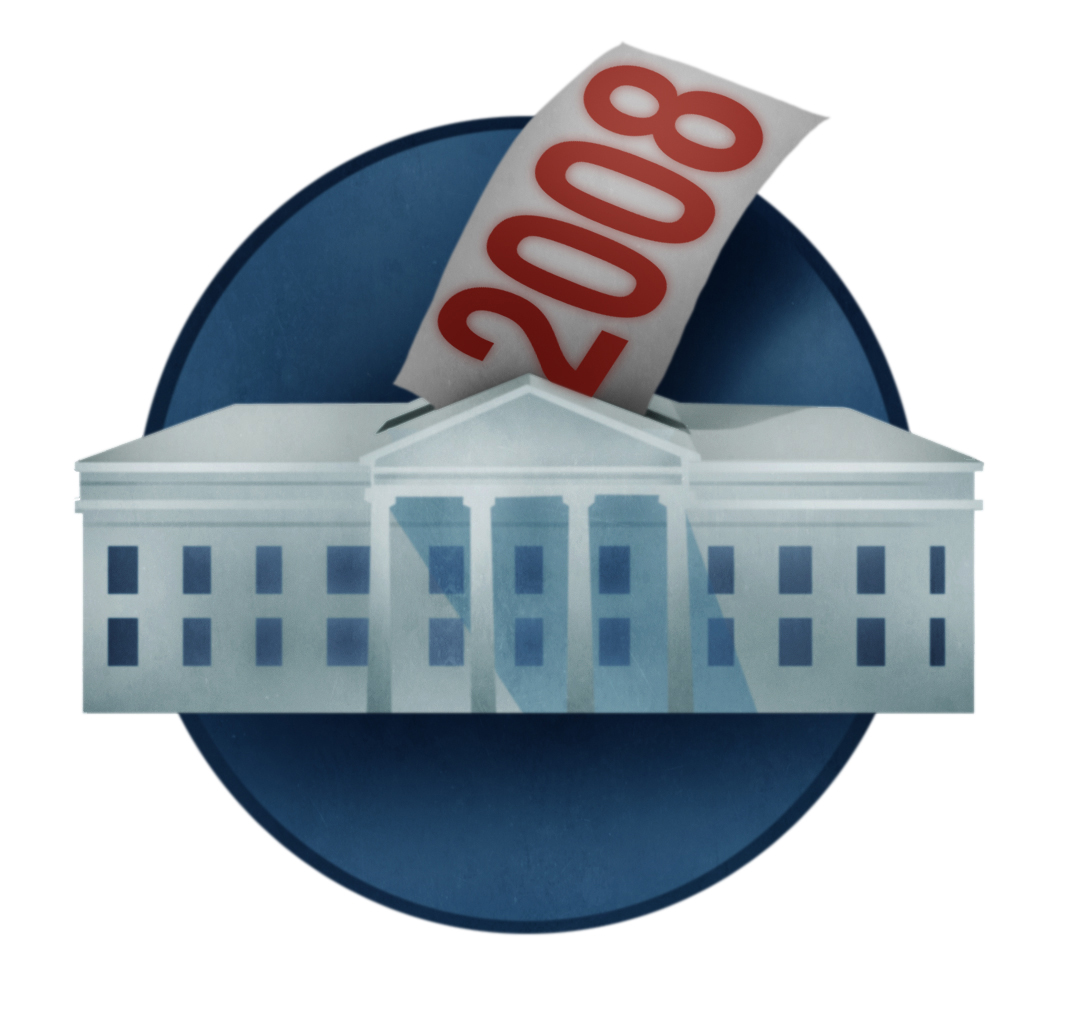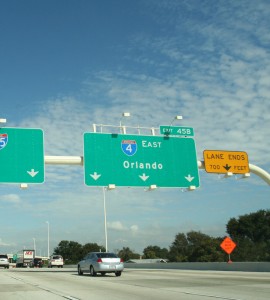Obama’s Victory Route Runs Through Florida
The highway connecting Tampa, Lakeland, Daytona Beach and Orlando may be the most important political real estate in the nation because it holds the key to the biggest chunk of independent voters in the biggest of all battleground states. These voters’ anxieties and financial troubles have now pushed the Democratic nominee ahead of his Republican rival in the polls there.
Jul 31, 2020104.2K Shares1.6M Views
On to Florida (flickr)
The town-hall style presidential debate is over, the swords — for the moment — withdrawn.
For most of the evening at Belmont University in Nashville, Sens. Barack Obama and John McCain attacked each other over domestic spending, foreign affairs and the best way to emerge from the cloak of economic darkness. They exchanged awkward, forced pleasantries with each other and the wives and said good night and good luck to Tom Brokaw, the debate moderator. Now it was time for both men to look elsewhere — particularly south to Florida and the 130-mile ribbon of highway known as Interstate 4.
Yes, the debate was important. But it was mere Tennessee shadow boxing, a preview of what’s to happen on the battleground known as Florida’s I-4 corridor. This is where the real fight will take place.
Illustration by: Matt Mahurin
That’s because the I-4 corridor may be the most important political real estate in the nation. Running through Tampa, Lakeland, Daytona Beach and Orlando, the corridor holds the key to the biggest chunk of independent voters in the biggest of all battleground states. These voters’ anxieties, fears and financial troubles have suddenly pushed the junior senator from Illinois ahead of his Republican rival in the polls here — by anywhere between five and seven percentage points. For now.
Rest assured that McCain will be in Florida soon enough. Because he, like Obama, knows I-4 is the road a candidate must travel to become president of the United States.
“It is the battleground,” the Orlando-based Democratic strategist Jim Kitchens said of the corridor. “It is ground zero.”
Much of the country has an outdated view of Florida and where its power lies. For so many, Florida means Miami, which Joan Didion once aptly described as “not a city at all but a tale, a romance of the tropics, a kind of waking dream in which any possibility would be accommodated.” It’s a view so persuasive that when Tina Fey, playing Alaska Gov. Sarah Palin in her latest “Saturday Night Live” skit, pandered to Florida, she said, “From a very young age, my two greatest loves were always Jews and Cuban food.”
The truth is that Florida is a far more complicated state, where constituencies and their concerns are evolving and morphing. It is a boom state gone bust. Beneath its white-hot sky, our national angst seems magnified, because here is where everything was supposed to be sunshine, supposed to go right.
But it all seems askew. Annually beset by hurricanes, home insurance rates have rocketed. The real estate crash that bruised so much of the country pummeled Florida, taking away thousands of jobs. The high price of gasoline helped kill thousands of pilgrimages of the young and old to the state’s vacation meccas– from DisneyWorld to Boca. Stories of people leaving — repeat leaving — the state have begun to pop up in local newspapers. The elderly have become anxious about what assets they will have in their golden years.
“We are really hurting down here,” said Richard Scher, a professor of political science at the University of Florida in Gainesville. “I’ve lived here a long time — 30 years — and I’ve never seen this state so anxious, so apprehensive, and it’s all economically based. The perception is that Mr. Obama has spoken more directly to these concerns than Mr. McCain has at this point.”
Flickr: Sylvar
When asked how things were going in the state, the Florida pollster Jim Kane — whose most recent study had Obama leading McCain by seven percentage points — said, “Badly.”
“Because it was a boom state,” Kane said, “we were at the peak of the housing bubble and [when it popped] that really devastated Florida. The other day, I talked to a realtor who hasn’t sold a house in two years — and that’s not atypical. Before, she was selling three houses a week. We had a four-to-five-year run during which you couldn’t not make money buying something in real estate.”
It’s been conventional wisdom that to know Florida, you must start with two groups: the elderly and Miami’s Cuban population. Both have been misunderstood. As Susan MacManus, a professor of political science at the University of South Florida in Tampa, explained, among registered independent voters, those older than 65 make up 23.6 percent of the voting pool.
And those 35 and under? 25.3 percent.
That statistic debunks the notion that the state is controlled by retirees.
So Florida is a study in true electoral power — in how a candidate can appeal best to two different demographic groups with seemingly little in common.
Moreover, many outside observers continue to overestimate the influence of the Cuban population. The fact is that Cubans represent four percent to six percent of Florida’s voting population. They are no longer even the largest Latino group in the state. While many older Cuban-Americans still reliably vote Republican, the Puerto Ricans who live along the I-4 corridor, and vote Democratic, have all but neutralized the perceived Cuban influence in the state.
Even among the Cubans in Miami, old Cold War sentiments and hatred of all things Democratic — because of JFK’s actions, or inaction, at the Bay of Pigs — have finally begun to fall away into history.
“They still play an important role, but their role is changing,” said Wayne Smith, who served as executive secretary of President Kennedy’s Latin American Task Force and as chief of mission in the U.S. Interests Section in Havana. He is now director of the Center for International Policy’s Cuba Program.
“Partially, it’s generational,” he said. “The hard hard-liners are the ones who have been here the longest, and they’ll always vote Republican.
“But then you have the younger generation, born in the United States, and those who came in the 1980s, who just aren’t like that. I think Obama has a good chance of winning Florida, in part, because of this.”
Indeed, the city Cubans have culturally loomed over doesn’t loom over the rest of the state. As far as media markets are concerned, Miami ranks third behind Tampa and Orlando — two cornerstones of the I-4 corridor. These are cities that, in Florida’s business-friendly environment, have been able to attract people from other parts of the country who have no ties to the old political allegiances that once defined Florida. They tend to be younger, college educated and more likely to consider themselves independents.
“Who wins the middle,” said David Beattie, a veteran Florida Democratic strategist, “is the one who wins the state.”
How a presidential candidate could do this appears more obvious with each passing day. If there is one issue that cuts across Florida, it is the economic reckoning of the past two weeks. The young professionals who fostered growth along the I-4 corridor find themselves beset with angst over their prosperity and the future of their children. The elderly wonder if their investments and savings can keep them afloat in retirement. The thousands of college students who the Obama campaign has targeted, at places like the University of Florida and Florida State, are gripped with fears about a life after college with no prospects for work.
There’s no question who has and hasn’t benefited from such angst. While McCain bumbled his way in the early days of the crisis, Obama emerged as the man of reason, the level-headed man of intellect when intellect, not folksiness, was needed.
Of course Obama’s been helped by the fact that Florida is controlled by a Republican legislature and governor, and the state population now takes a dim view — surprise — of President George W. Bush. Nor, says Scher, have the personal attacks leveled against Obama, particularly by Palin in recent days, reached the right target.
“Having watched politics here for more than three decades, I can say the independents like their politics fairly bland,” Scher said. “One could say the politics of the state is pretty bland. We don’t usually choose ideological candidates. I have never seen Floridians who look approvingly at gutter politics. That doesn’t play well in this state. I don’t know who’s advising McCain, but I think he’s got the culture of the state all wrong.”
The Obama campaign, meanwhile, seems to have captured it just right. If Florida, in its geographic size and racial diversity, can be seen as a microcosm of the country, then you can truthfully say the campaign has run a mini-version of their national plan.
As it has done in nearly every state, the Obama campaign has, in Beattie’s words, run a “spread offense,” flooding the state with field offices and paid staffers. Further, they’ve done well with voter registration in sich African-American strongholds as Jacksonville. An aggressive voter-registration drive yielded 415,580 new voters as of the beginning of last month, double the number the Republicans signed up. Outreach efforts have even been made in the staunchly Republican panhandle, the one part of the state culturally tied to the South.
“What the goal has been is to cut margins in places like that,” said Kitchens. “If you only get beat 54 to 46, as opposed to 60 to 40, that’s a huge difference.”
But this is not a state McCain can afford to concede — unlike Michigan. It has the fourth largest number of electoral votes, behind solidly blue California and New York, and the burning-red Texas. When McCain effectively abandoned Michigan last week, some reports cited the move as a response to Obama’s surge in Florida.
“The path to winning the presidency for any Republican is not a path that includes losing Florida,” Beattie said. “It is a must win for McCain.”
Yet the old soldier has reason for hope. Because there’s no question the race in Florida will remain close. Florida is not a state you can break open. Not when it has roughly 20 military bases and a large number of veterans who believe in everything McCain stands for. Not when it has a sizable evangelical base now energized by Palin.
“It’ll still be the battleground people predicted it to be,” said MacManus of the University of South Florida. “The lead has changed so many times I think you predict at your own peril.”
Starting today, Obama and McCain again go their separate ways. But one can expect that both nominees must, at some point, travel that same Southern terrain — shuttling among Orlando and Tampa and Lakeland, seeking to convince those struggling in the the fading prosperity of the I-4 corridor that he is the one who can best help their plight. That he has the answers.
By Nov. 4, it may be a well-traveled corridor whose constituents could have tired of the attention. But their ultimate choice might very well decide who takes the White House.

Rhyley Carney
Reviewer
Latest Articles
Popular Articles


